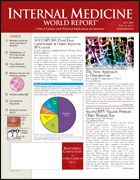Publication
Article
Incomplete Colonoscopies Linked to Inadequate Bowel Prep
Author(s):
By Bruce Sylvester
WASHINGTON, DC—No one wants to go through it twice, and no one wants to pay for it twice either. So what simple things can be done to help ensure that a colonoscopy will be complete?
Data from over 145,000 outpatient colonoscopy procedures indicate that adequate bowel preparation and sedation are "modifiable" actions that can help ensure a complete colonoscopy and preserve its diagnostic integrity, according to findings presented at Digestive Disease Week.
IMWR
"In our field we have a strong and sometimes conflicted ongoing discussion about the effectiveness of colonoscopy as a screening tool for cancer. Some recent data have suggested that we have relatively high miss rates for carcinomas and lesions in the colon," lead investigator Berndt Birkner, MD, a practicing gastroenterologist from Munich, Germany, told . "Our aim was to see what criteria for incomplete procedures can be found in the routine setting."
Using a web-based system, Dr Birkner and colleagues were able to document all colonoscopies performed in Bavaria, Germany, during 9 months in 2006. "We wanted to see why incomplete colonoscopies happened, since, in the worst case, incomplete procedures can lead to our missing carcinomas and lesions," he said.
The investigators, some in private practice and some associated with the University of Munich, analyzed a database containing the records of 145,401 outpatient colonoscopies performed by the Compulsory Health Insurance Physicians in Bavaria.
The database includes demographic characteristics, colonoscopy indications, "process quality" indicators, macroscopic and histologic findings, diagnosis, and acute complications, as well as further diagnostic and therapeutic recommendations.
Use of colon preparation resulted in a clean bowel in 110,648 of the 145,401 patients (76.1%), with liquid residues remaining in 32,479 cases (22.3%) and a dirty bowel in 2274 cases (1.6%).
Most colonoscopies involved the use of sedation or analgesia (134,655; 92.6%).
A total of 141,425 colonoscopies reached the cecum or ileum (97.3%); 3976 examinations were incomplete, and photo documentation was available for 99% of the procedures.
Reasons for incomplete examinations were adhesions (12.9% of incomplete colonoscopies), impassable stenosis (12.7%), a long and curved colon (7.1%), and complications (1.3%). No reason was specified in one third of cases.
A greater risk for incomplete colonoscopies was found in:
- Older patients
- Those with insufficient bowel preparation or with liquid residues
- Those undergoing curative colonoscopies.
The groups that were more likely to have a complete colonoscopy were:
- Men
- Sedated patients.
"We found that proper sedation and preprocedure bowel preparation stood out as modifiable preparations that can lower the risk of an incomplete colonoscopy," said Dr Birkner.
He noted that poor preparation significantly increases the risk of having an incomplete colonoscopy. "We have introduced a program of mandatory documentation of landmarks in the cecum," he said. "And if you can't document the information because of bad preparation, you will not get paid for the procedure. That is now an incentive to make sure there is a very good prep."
KEY POINTS
- Adequate use of bowel preparation and sedation can help ensure a complete and reliable colonoscopy.
- Incomplete colonoscopies are common in older patients, those with insufficient bowel preparation or liquid residues, and those undergoing curative colonoscopies.
- Some endoscopists are now offering in-office prep on the day of the procedure.
IMWR
Commenting on this research, Len Horowitz, MD, attending physician at Lenox Hill Hospital in New York City, told , "While most preparations for colonoscopy result in a successful examination, over 22% of bowel preps result in excess liquid residue." He noted that many patients have turned to high-colonic enemas on the morning of the procedure, often citing the theory of "toxin cleansing" of the colon and the desire for a better prep.
And some "endoscopists who perform this procedure are beginning to offer in-office prep on the day of the procedure. This will certainly make it easier to do what we all have to do to take care of ourselves," he added.
Dr Horowitz stressed, "All patients need to be 100% compliant with the dietary and laxative instructions given to them by the physician performing the colonoscopy."






